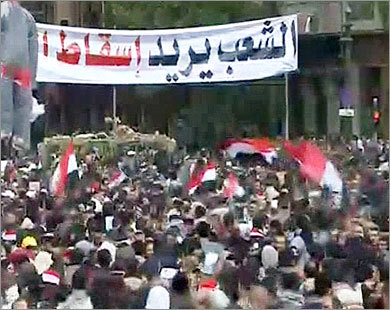West turns up heat on Syria after '473 Ramadan killings'
AFP
DAMASCUS- Security forces made arrests and deployed tanks Wednesday after a Muslim holy month during which 473 people were killed, activists said, as Western powers turned up the heat on Syria's regime.
The Syrian Observatory for Human Rights said 16 people were arrested in Houle, 20 kilometres (12 miles) from Homs, where the authorities had sparked anger as they returned the bodies of 13 people arrested in early August.
The Local Coordination Committees, grouping activists on the ground, said security forces SET fire to the homes of two men in Houle and threatened to arrest their wives and children if they did not surrender.

They said that in Hama province, central Syria, opposition figure Mustafa Rostom was arrested from his home by military intelligence agents who prevented him from taking medicines with him although he has health problems.
Elsewhere in the province, tanks were deployed in Al-Qussur and security forces massed in Al-Hader, according to the Coordination Committees. More widespread arrests were carried out.
The Britain-based Observatory said 360 civilians and 113 members of the security forces and army were killed during protests during the just-ended Muslim fasting month.
The civilians included 25 people under 18, 14 women and 28 who died in detention or under torture, the Observatory said, mainly in the central province of Homs.
Almost daily protests have taken place against the regime of President Bashar al-Assad since mid-March, defying a crackdown which according to UN figures has killed at least 2,200 people.
Amnesty International said in a separate report that it had heard of 88 deaths in custody between April 1 and August 15, including 10 children aged between 13 and 18.
For at least 52 of them, Amnesty said "there is evidence that torture caused or contributed to the deaths," citing signs of violent beatings, burn marks and cuts.
Some had been mutilated "before or after death in particularly grotesque ways apparently intended to strike terror into the families to whom their corpses were returned."
The United States denounced what it called the Syrian regime's "abhorrent abuse" of prisoners.
The Amnesty report "is just further" evidence of "the regime's abhorrent abuse of prisoners. It's unconscionable," State Department spokeswoman Victoria Nuland told reporters in Washington.
"Clearly a government that murders and tortures its own citizens including children can't be considered legitimate by any of us," she said.
French President Nicolas Sarkozy, in his annual address to France's top diplomats on Wednesday, said Assad's actions had caused "irreparable" damage to his legitimacy and vowed to support his overthrow.
"The regime in Damascus wrongly believes it is safe from its own people," Sarkozy said.
"What the Syrian president has done is irreparable. France, with its partners, will do all that is legally possible in order that the Syrian people's hopes for freedom and democracy are triumphant."
The United States slapped sanctions on Syria's foreign minister and two other top officials on Tuesday as it pressed Assad's regime to stop its deadly crackdown.
The Treasury Department sanctions are the third in a series of punitive US measures placed on Assad and top government officials and follow calls by President Barack Obama for Assad to step down.
Asset freezes and bans on business interactions were imposed on Foreign Minister Walid Muallem, top presidential adviser Bouthaina Shaaban and Syria's ambassador to Lebanon, Ali Abdul Karim Ali, the Treasury Department said.
Nuland linked the sanctions to "the role that (they) play in propagating and advancing the reign of terror."
The new sanctions follow an August 18 order signed by Obama that froze all Syrian state assets inside the United States and forbade investment and exports to the country.
It also banned imports of oil and gas from Syria, aiming to hurt a key revenue stream for the Assad regime.
--------------------------------------------------------------------------------------